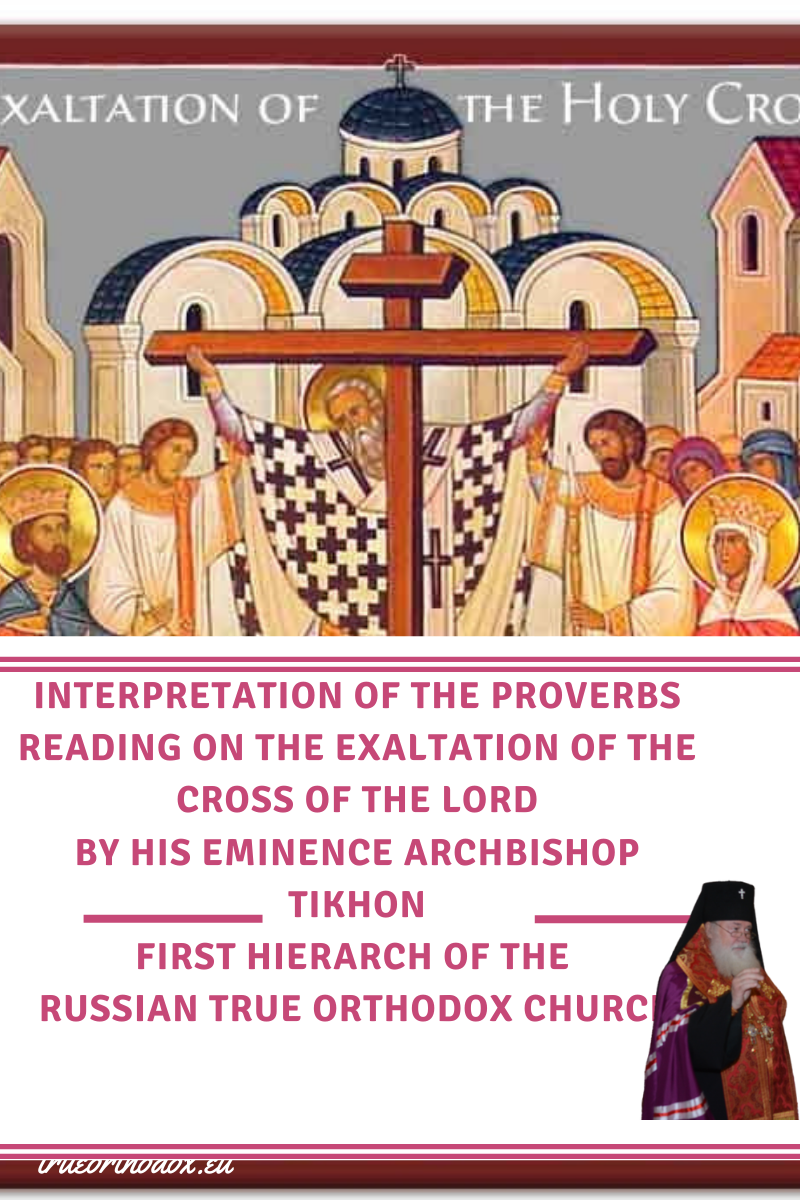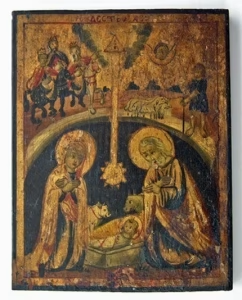INTERPRETATION OF THE PROVERBS READING ON THE EXALTATION OF THE CROSS OF THE LORD BY HIS EMINENCE ARCHBISHOP TIKHON FIRST HIERARCH OF THE RUSSIAN TRUE ORTHODOX CHURCH – English and Russian

My son, despise not the chastening of the Lord; nor faint when thou art rebuked of him: for whom the Lord loves, he rebukes, and scourges every son whom he receives. Blessed is the man who has found wisdom, and the mortal who knows prudence. For it is better to traffic for her, than for treasures of gold and silver. And she is more valuable than precious stones: no evil thing shall resist her: she is well known to all that approach her, and no precious thing is equal to her in value. For length of existence and years of life are in her right hand; and in her left hand are wealth and glory: out of her mouth proceeds righteousness, and she carries law and mercy upon her tongue. Her ways are good ways, and all her paths are peaceful. She is a tree of life to all that lay hold upon her; and she is a secure help to all that stay themselves on her! (Proverbs 3:11-18).
This proverb, in the language of parables urges us to “despise not” all “chastening” from the Lord. This includes all everyday adversities, illnesses, deprivations, and every kind of failure. Why is this necessary? Because the Lord educates a person for the Kingdom of God with them. If these measures are rejected, then sorrows will not disappear, and irritation and dissatisfaction with everything grow in the soul. One can become exasperated. Solomon also warns against despondency with the words “nor faint,” since despondency enervates the soul and deprives it of the main thing for which “chastening” is allowed — repentance. To make it easier to come to terms with this way of upbringing, the author of the parable points out the main comforting thought in all adversity: the Lord reacts to the shortcomings of each of us in this way because he treats everyone as a father to his son – not indifferently, but with love. In addition, everything that has to be endured in life leads to experience, prudence, even wisdom. To have this is more important and more significant than treasures of “gold and silver.” Wisdom gained through patience not only has greater value than worldly goods, but also rewards its possessor with peace of soul. This peace leads to reliable happiness in both spiritual and everyday life. The reliability and strength of this happiness is due to the fact that it rests on the “tree of life,” that is, the power of God lets a person know what to do, and protects him from hesitation, doubt, and storms that can destroy everything in life.
Why are these lines about wisdom read on this feast?
Because the final words of the parable about the “tree of life” are attributed by the Church to the Cross of Christ. In the Cross of the Lord (His crucifixion), the love of God for each individual person and for humanity as a whole was revealed to man. The supreme wisdom of the earth is to die with Christ to the bondage of sin, to reject the pride of the enemy, and to be baptized “into His death,” so that we may rise again to life in Him and with Him.
++++++++++++
ТОЛКОВАНИЕ ПАРЕМИИ НА ВОЗДВИЖЕНИЕ КРЕСТА ГОСПОДНЯ
Книга Притчей (III, 11-18)
Наказания Господня, сын мой, не отвергай, и не тяготись обличением Его; ибо кого любит Господь, того наказывает и благоволит к тому, как отец к сыну своему. Блажен человек, который снискал мудрость, и человек, который приобрел разум, — потому что приобретение ее лучше приобретения серебра, и прибыли от нее больше, нежели от золота: она дороже драгоценных камней; [никакое зло не может противиться ей; она хорошо известна всем, приближающимся к ней,] и ничто из желаемого тобою не сравнится с нею. Долгоденствие — в правой руке ее, а в левой у нее — богатство и слава; [из уст ее выходит правда; закон и милость она на языке носит;] пути ее — пути приятные, и все стези ее — мирные. Она — древо жизни для тех, которые приобретают ее, — и блаженны, которые сохраняют ее!
Эта паремия словами притч призывает «не пренебрегать» всеми «наказаниями» от Господа. Сюда относятся все житейские бедствия, болезни, лишения, всевозможные неудачи. Почему это нужно? Потому что Господь ими воспитывает человека для Царствия Божия. Если отвергать эти меры, то скорби не исчезнут, а в душе будет расти раздражение, недовольство всем. Можно так дойти и до озлобления. Соломон предостерегает и от уныния словами «не ослабевай», так как уныние расслабляет душу и лишает ее главного, ради чего допускается «наказание», — раскаяния. Чтобы легче было смириться с таким способом воспитания, автор притчей указывает на основную утешающую мысль во всех невзгодах: Господь так реагирует на недостатки каждого из нас потому, что относится к каждому, как отец к сыну, не равнодушно, а с любовью. К тому же все, что приходится терпеть в жизни, приводит к опытности, благоразумию, даже мудрости. Иметь это важнее и значительнее, чем «злата и сребра» сокровища. Премудрость, приобретенная в терпении, не просит ценнее житейских благ, но и награждает своего обладателя миром души. Мир этот приводит к надежному счастью и в духовном плане и в житейском. Надежность, прочность этого счастья оттого, что оно опирается на «древо живота», то есть сила Божия дает человеку знать, что делать, защищает от колебаний, сомнений, бурь, способных разрушить все в жизни.
Почему строки о премудрости читаются в этот праздник?
Потому что заключительные слова притчей о «древе живота» Церковь относит к Кресту Христову. В Кресте Господнем (Его распятии) людям открылась любовь Божия к каждому отдельному человеку и к человечеству в целом. Высшая премудрость земли — это умереть со Христом для рабства греху, отвергнуть вражию гордыню, креститься «в смерть Его», чтобы и воскреснуть для жизни в Нем и с Ним.





